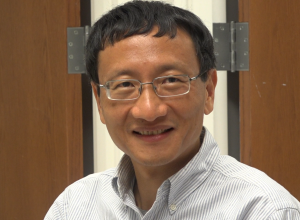
“In general, this technology could be applied to almost any disease…”
-Dr. J. Julius Zhu
Professor of Pharmacology Dr. J. Julius Zhu and his team at the University of Virginia School of Medicine have developed a new technology that could mean a future without side effects in medications. The approach is more efficient than the ways that researchers currently develop drugs, and could bring doctors much closer to cures for all conditions spurred by genetic mutations — including cancer, Alzheimer’s disease, cystic fibrosis, and Sickle-cell disorder, just to name a few.
Zhu explained the struggles that doctors have faced for years when trying to eliminate side effects in medical treatments, such as chemotherapy.
“The challenge is to know where [afflicted molecules] are located,” Zhu said. “The cell has many different compartments, and molecules in each compartment could do very different things…We have this technology now — we can manipulate specifics at particular locations of the molecule, and we can save a molecule in a particular place.”
He discussed why his findings, which allow researchers to pinpoint the precise problem areas in a diseased cell using a technique he calls “precision medicine,” have constituted a major breakthrough in medical research.
“It’s a significant advance in science that will allow us to pursue drugs without side effects,” Zhu said. “Now that we have this technology, we can manipulate a molecule at a particular position…In general, this technology could be applied to almost every disease, because almost all diseases depend on defects in the molecules that are functioning. In theory, all diseases could take advantage of this technology to improve their medicines.”
When considering the future of medicine, Zhu was optimistic that his techniques will improve patients’ treatments, and that more innovations will follow.
“Probably many other technologies will come up to improve the same medicines, but this certainly helps direct [us] to the point, to the position where medicine will be in the future,” he said. “We need more funding, more research on this before we can transform the science into medicines to help human welfare.”
While more time and resources are required to achieve his goals, Zhu asserted that the University community is on his side, and he felt that most understand how crucial his work is for public health and wellbeing.
“I think people understand that this is an advance of basic science, fundamental science,” he said. “The technology we are developing — the approach — is not that invasive, and it’s getting better by the day. We are using this; some types are already getting to the hospitals, so it is getting there.”
Zhu also explained the role of students in his research, crediting their enthusiasm, in part, for the project’s success.
“Not only the PhD students that are working here — there are a lot of undergraduate students working in my lab, which also helps,” Zhu said. “It’s a lot of students who work together. They help with experiments, and of course contributed to the whole project in their way.”
















